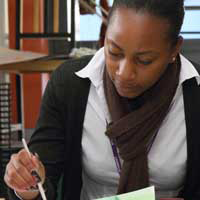Currently in school I am co-leading staff CPD on ‘Challenge’ across the curriculum. The focus of this project is raising the level of challenge for students at all stages of the lesson.
We are using Mike Hughes’ 4 part lesson structure as a basis for this – Context and Challenge, Receiving New Information, Making Sense of Information and Reflecting and Reviewing. By using a range of activities the aim is that throughout the 4 stages (which can of course repeat during one lesson, or span a series of lessons) the level of challenge will be ‘flowing’ with the students actively involved in their learning.
 So, how do we get our Sociologists into the ‘Flow’? The key is perhaps variety, but also getting them involved in the process by using learning language to introduce tasks. For example: “Use page 117, Read the section on Racism in Wider Society, then:
So, how do we get our Sociologists into the ‘Flow’? The key is perhaps variety, but also getting them involved in the process by using learning language to introduce tasks. For example: “Use page 117, Read the section on Racism in Wider Society, then:
1. Translate John Rex’s idea into a picture;
2. Summarise Noon’s study into no more than 20 words.” Instead of saying: “Read page 117 and make notes.”
The idea being that the students are then more actively involved in the process, and are ‘making sense’ of the information. I like this strategy as it takes seconds to alter the wording of tasks in this way! Others to try might be Reduce x into no more than x words; Identify the most important argument from the paragraph; Transform the theory into a flow chart.
A few other ideas:
Placemat Consensus: I used this for Secularisation on A2. Students draw a grid (avoids printer issues!) as below, in a 4 each student takes a section and adds as many ideas as they can in answer to a given question (eg. Is Secularisation happening worldwide?). The group then share their ideas and come to a ‘consensus’ about which are the best / most popular / most important / common and put them in the middle to feedback to the class.
Washing Line – tie some string between two chairs or two plastic bottles, the students can either write key info on post-its or you can provide them with info in small pieces, they then need to paper-clip them onto the washing line in order of importance / how much impact factors have / which sociologists most accurate etc. This activity can also be done as an opinion line, with each student representing a factor to save resources, or simply lining up according to their opinion on a question and justifying their place.
Build a Body – this is a good way of practising note-making and research skills but they think it’s something much more exciting…. Using some large paper, students are in groups and they draw around one group member. They then need to ‘annotate’ the body with the relevant information summarised from text books etc, along the way they need to prioritise the information, placing the most important/relevant info or factors with most impact, at the head and so on. This could work well for factors influencing educational achievement at AS, eg ‘Which factors both in and out of school would influence a Pakistani working class girl and her GCSE scores.’
Esther Zarifi
Esther Zarifi has taught RE (Philosophy and Ethics) and Sociology for 8 years at a 13-18 school in a small town outside Newcastle upon Tyne.



